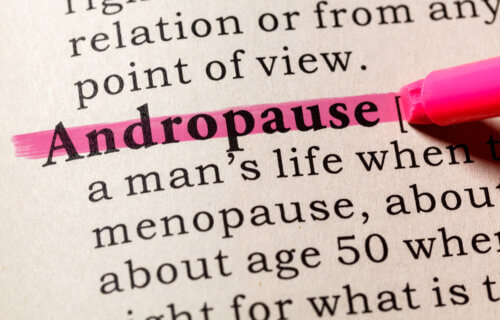Is “male menopause” a real thing? It sure is. It’s called “andropause.” However, you may not have seen or heard much about it.
At any given time, 25 million men between 40 and 55 years old experience andropause in the United States. That’s roughly equivalent to the number of diabetics in the country. Despite the substantial number of men in andropause, there’s a real dearth of research and published material about this stage of life. There are also few clinical trials. It’s important, however, to understand this passage of a man’s life, especially as it affects the heart and blood vessel (cardiovascular) system. Cardiovascular disease is the world’s number one cause of death.
Andropause refers to middle-aged and aging men with signs and symptoms of declining male hormones. You may hear this stage referred to as a man’s “mid-life crisis.” The decline is often associated with depression, waning libido (sex drive), sexual dysfunction, loss of muscle mass and tone, and increased abdominal fat. These complex changes are not just hormonal; they are also psychological, interpersonal, social, sexual, and spiritual.
A man’s loss of testosterone can begin as young as age 35 years. It’s a gradual process, with a loss of 1 to 1.5 percent of total testosterone per year. It can take years for a man to develop symptoms, unlike the sudden plunge of estrogen experienced during menopause. The symptoms are like those experienced by women, but men retain fertility, unlike women.
At the same time, thyroid hormone, growth hormone, and DHEA (another hormone) decline in men beginning in their mid-20’s. Signs and symptoms begin in the 30s to 40s. By age 80, most male hormone levels decrease to pre-puberty levels.
The signs of decline are vague, but include:
- A subjective sense of low energy
- Increasing irritability
- Decline in mood
- Decline in cognitive performance
- Loss of early morning erections
- Decreased fertility
- Increased body fat
- Decreased muscle mass
- Gynecomastia
- Change in size or firmness of testicles
- Signs of osteoporosis
Andropause’s Link To Cardiovascular Disease
Whether the decline in male hormones is the direct cause of heart disease or just an association is controversial. It is unclear if aging of the heart cells is the cause of disease. If age-related changes can be prevented or delayed, it results in greater well-being and quality of life in the elderly. Elderly persons’ high self-ratings of well-being are correlated to reduced mortality. Also, people who are objectively healthy may rate their health better.
In extreme cases, andropause leads to frailty, decreased reserve, and ability to adapt from cumulative decline and increased vulnerability of multiple body systems. Chronic heart failure is associated with age and andropause, but a causal relationship hasn’t been proven. Many processes contribute to heart failure, but there is no evidence that andropause directly leads to heart failure.

There is probably a causal relationship between aging and low androgen levels. There is also an association with increased cardiovascular risk, the occurrence of chest pain, and the progression of symptomatic disease. The necessity of testosterone replacement or clearly beneficial effects on the cardiovascular system during andropause is not established, in part due to the lack of convincing scientific data in controlled studies.
There is also fear of the development of side effects, as seen in uncontrolled use, such as with abuse by competitive athletes. Testosterone replacement therapy is indicated in men with a clinical deficiency or absence of testosterone. Testosterone substitution might be beneficial for symptom improvement for men with reduced libido, loss of muscle mass and strength, and other symptoms of andropause.
A Doctor’s Thoughts On Andropause
Men, see your primary doctor at least once per year or as your doctor recommends. Each man has his own unique experience with andropause and aging, and management should be individualized.
The risks and benefits of over-the-counter supplements, marketed as products that contain or replace testosterone for restoring virility, are largely unknown. Formulations are inconsistent in quality and composition, even within the same brand. They are not recommended.
